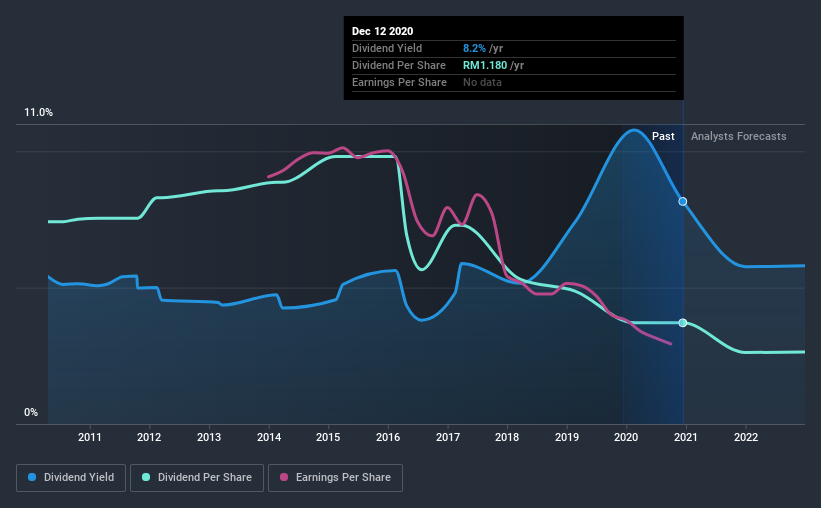Are Dividend Investors Getting More Than They Bargained For With British American Tobacco (Malaysia) Berhad's (KLSE:BAT) Dividend?

Today we'll take a closer look at British American Tobacco (Malaysia) Berhad (KLSE:BAT) from a dividend investor's perspective. Owning a strong business and reinvesting the dividends is widely seen as an attractive way of growing your wealth. Yet sometimes, investors buy a stock for its dividend and lose money because the share price falls by more than they earned in dividend payments.
With British American Tobacco (Malaysia) Berhad yielding 8.2% and having paid a dividend for over 10 years, many investors likely find the company quite interesting. It would not be a surprise to discover that many investors buy it for the dividends. That said, the recent jump in the share price will make British American Tobacco (Malaysia) Berhad's dividend yield look smaller, even though the company prospects could be improving. Some simple analysis can reduce the risk of holding British American Tobacco (Malaysia) Berhad for its dividend, and we'll focus on the most important aspects below.

Payout ratios
Dividends are usually paid out of company earnings. If a company is paying more than it earns, then the dividend might become unsustainable - hardly an ideal situation. As a result, we should always investigate whether a company can afford its dividend, measured as a percentage of a company's net income after tax. British American Tobacco (Malaysia) Berhad paid out 95% of its profit as dividends, over the trailing twelve month period. Its payout ratio is quite high, and the dividend is not well covered by earnings. If earnings are growing or the company has a large cash balance, this might be sustainable - still, we think it is a concern.
We also measure dividends paid against a company's levered free cash flow, to see if enough cash was generated to cover the dividend. With a cash payout ratio of 130%, British American Tobacco (Malaysia) Berhad's dividend payments are poorly covered by cash flow. Paying out such a high percentage of cash flow suggests that the dividend was funded from either cash at bank or by borrowing, neither of which is desirable over the long term. Cash is slightly more important than profit from a dividend perspective, but given British American Tobacco (Malaysia) Berhad's payouts were not well covered by either earnings or cash flow, we would definitely be concerned about the sustainability of this dividend.
Consider getting our latest analysis on British American Tobacco (Malaysia) Berhad's financial position here.
Dividend Volatility
From the perspective of an income investor who wants to earn dividends for many years, there is not much point buying a stock if its dividend is regularly cut or is not reliable. For the purpose of this article, we only scrutinise the last decade of British American Tobacco (Malaysia) Berhad's dividend payments. Its dividend payments have declined on at least one occasion over the past 10 years. During the past 10-year period, the first annual payment was RM2.4 in 2010, compared to RM1.2 last year. The dividend has shrunk at around 6.7% a year during that period. British American Tobacco (Malaysia) Berhad's dividend hasn't shrunk linearly at 6.7% per annum, but the CAGR is a useful estimate of the historical rate of change.
When a company's per-share dividend falls we question if this reflects poorly on either external business conditions, or the company's capital allocation decisions. Either way, we find it hard to get excited about a company with a declining dividend.
Dividend Growth Potential
With a relatively unstable dividend, and a poor history of shrinking dividends, it's even more important to see if EPS are growing. Over the past five years, it looks as though British American Tobacco (Malaysia) Berhad's EPS have declined at around 22% a year. With this kind of significant decline, we always wonder what has changed in the business. Dividends are about stability, and British American Tobacco (Malaysia) Berhad's earnings per share, which support the dividend, have been anything but stable.
Conclusion
When we look at a dividend stock, we need to form a judgement on whether the dividend will grow, if the company is able to maintain it in a wide range of economic circumstances, and if the dividend payout is sustainable. It's a concern to see that the company paid out such a high percentage of its earnings and cashflow as dividends. Earnings per share have been falling, and the company has cut its dividend at least once in the past. From a dividend perspective, this is a cause for concern. In this analysis, British American Tobacco (Malaysia) Berhad doesn't shape up too well as a dividend stock. We'd find it hard to look past the flaws, and would not be inclined to think of it as a reliable dividend-payer.
Market movements attest to how highly valued a consistent dividend policy is compared to one which is more unpredictable. Meanwhile, despite the importance of dividend payments, they are not the only factors our readers should know when assessing a company. Case in point: We've spotted 3 warning signs for British American Tobacco (Malaysia) Berhad (of which 1 is potentially serious!) you should know about.
If you are a dividend investor, you might also want to look at our curated list of dividend stocks yielding above 3%.
If you’re looking to trade British American Tobacco (Malaysia) Berhad, open an account with the lowest-cost* platform trusted by professionals, Interactive Brokers. Their clients from over 200 countries and territories trade stocks, options, futures, forex, bonds and funds worldwide from a single integrated account. Promoted
Valuation is complex, but we're here to simplify it.
Discover if British American Tobacco (Malaysia) Berhad might be undervalued or overvalued with our detailed analysis, featuring fair value estimates, potential risks, dividends, insider trades, and its financial condition.
Access Free AnalysisThis article by Simply Wall St is general in nature. It does not constitute a recommendation to buy or sell any stock, and does not take account of your objectives, or your financial situation. We aim to bring you long-term focused analysis driven by fundamental data. Note that our analysis may not factor in the latest price-sensitive company announcements or qualitative material. Simply Wall St has no position in any stocks mentioned.
*Interactive Brokers Rated Lowest Cost Broker by StockBrokers.com Annual Online Review 2020
Have feedback on this article? Concerned about the content? Get in touch with us directly. Alternatively, email editorial-team@simplywallst.com.
About KLSE:BAT
British American Tobacco (Malaysia) Berhad
Engages in the sale, marketing and importation of cigarettes, pipe tobaccos, cigars, devices, other tobacco products, and nicotine products in Malaysia.
Good value with mediocre balance sheet.
Similar Companies
Market Insights
Community Narratives



